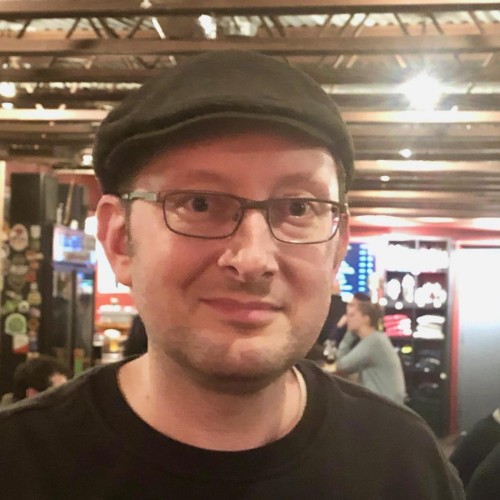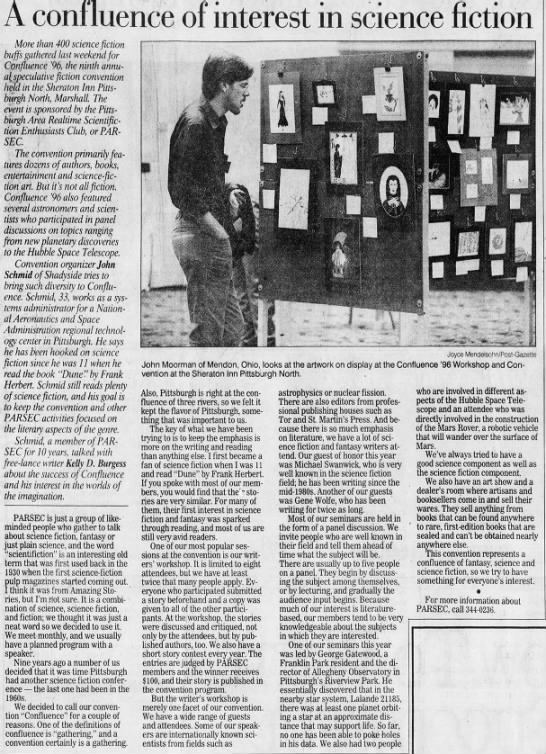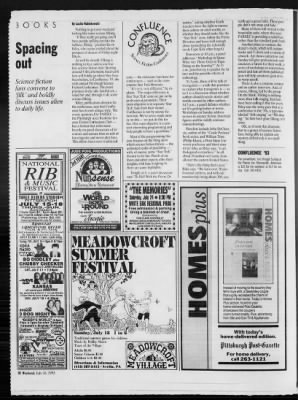Confluence Flier
Confluence in the News
Also see Confluence History for information on previous Confluence conferences
Next Pittsburgh news article on Confluence
by Michael Machosky
July 27, 2022
Read on Next Pittsburgh here
The Confluence science fiction conference began way back in 1988 when many things we take for granted today (including the internet) existed mostly in the imagination of science fiction writers such as Williams Gibson (“Neuromancer,” 1984) and Orson Scott Card (“Ender’s Game,” 1985).
If you’re guessing that a science fiction convention would be popular here in Pittsburgh — with its density of scientists and engineers — you’d be correct. Confluence, however, is rebuilding after the dystopian sci-fi-like weirdness of the pandemic, including a virtual conference and one that was canceled outright.
So this year’s in-person Confluence, which runs from Friday, July 29, through Sunday, July 31, at the Sheraton Pittsburgh Airport Hotel, is on the small side.
“We’re not a focused convention. It’s a general con,” says Kevin Hayes, who has helped to organize Confluence from nearly the beginning. “I mean, if somebody showed up as a furry, they would be absolutely welcomed, but it’s not Anthrocon. They could walk around the hall and have a great time. We don’t have a lot of accommodations for cosplay or costuming, but it’s fine if you want to do that.”
Confluence has a Code of Conduct that promises harassment will not be tolerated and any complaints will be addressed.
The focus remains on the craft of science fiction/fantasy and Confluence 2022’s guest list includes writers, editors and artists.
“One of the neatest things was the kinds of panels we could put together,” says Hayes. “We can have a writer from Singapore and a writer from Paris, a writer from Philadelphia, and an editor from Seattle all on the same panel talking about science fiction.”
One highlight is a pitch session with Claire Eddy, executive editor at Tor Books, where you can pitch your novel to one of the most influential science fiction publishers. The guest of honor is Neil Clarke from New Jersey, editor of the Hugo- and World Fantasy Award-winning Clarkesworld Magazine.
Trends of course come and go in science fiction. Right now, there are a few that seem to have momentum, including “hopepunk” (as seen in DreamForge Magazine), which conveys a more optimistic look at the future. That contrasts with a trend called “grimdark,” which edges into horror. There’s currently a lot of science fiction being written about climate change, which clearly weighs on a lot of people’s minds.
And the genre is becoming more diverse, with LGBTQ writers and Black sci-fi/fantasy “Afrofuturism,” often inspired by the late, legendary Octavia E. Butler.
Confluence is run by Parsec, a nonprofit that also runs a short story contest for youth writers (under the age of 18), and meets regularly at the Squirrel Hill Library to host special guests.
Michael Machosky is a writer and journalist with 18 years of experience writing about everything from development news, food and film to art, travel, books and music. He lives in Greenfield with his wife, Shaunna, and 10-year old son.
A confluence of interest in science fiction
Pittsburgh Post-Gazette
Date: Sunday Aug 04, 1996
Page: 161
Writer: Kelly D. Burgess
Image text: John Moorman of Mendon, Ohio, looks at the artwork on display at the Confluence ’96 Workshop and Convention at the Sheraton Inn Pittsburgh North.
Photographer: Joyce Mendelsohn
Source
Article Text:
More than 400 science fiction buffs gathered last weekend for Confluence ’96, the ninth annual speculative fiction convention held in the Sheraton Inn Pittsburgh North, Marshall. The event is sponsored by the Pittsburgh Area Real time Scientifiction Enthusiasts Club, or PARSEC.
The convention primarily features dozens of authors, books, entertainment and science-fiction art. But it’s not all fiction. Confluence ’96 also featured several astronomers and scientists who participated in panel discussions on topics ranging from new planetary discoveries to the Hubble Space Telescope.
Convention organizer John Schmid of Shadyside tries to bring such diversity to Confluence. Schmid, 33, works as a systems administrator for a Nation Aeronautics and Space Administration regional technology center in Pittsburgh. He says he has been hooked on science fiction since he was 11 when he read the book “Dune” by Frank . Herbert. Schmid still reads plenty of science fiction, and his goal is to keep the convention and other PARSEC activities focused on the literary aspects of the genre.
Schmid, a member of PARSEC for 10 years, talked with freelance writer Kelly D. Burgess about the success of Confluence and his interest in the worlds of the imagination.
PARSEC is just a group of like-minded people who gather to talk about science fiction, fantasy or just plain science, and the word “scientifiction” is an interesting old term that was first used back in the 1930’s when the first science-fiction pulp magazines started coming out. I think it was from Amazing Stories, but I’m riot sure. It is a combination of science, science fiction, and fiction; we thought it was just a neat word so we decided to use it. We meet monthly, and we usually have a planned program with a speaker.
Nine years ago a number of us decided that it was time Pittsburgh had another science fiction conference the last one had been in the 1960’s.
We decided to call our convention “Confluence” for a couple of reasons. One of the definitions of confluence is “gathering,” and a convention certainly is a gathering. Also, Pittsburgh is right at the confluence of three rivers, so we felt it kept the flavor of Pittsburgh, something that was important to us.
The key of what we have been trying to is to keep the emphasis is more on the writing and reading than anything else. I first became a fan of science fiction when I was 11 and read “Dune” by Frank Herbert. If you spoke with most of our members, you would find that the stories are very similar. For many of them, their first interest in science fiction and fantasy was sparked through reading, and most of us are still very avid readers.
One of our most popular sessions at the convention is our writers’ workshop. It is limited to eight attendees, but we have at least twice that many people apply. Everyone who participated submitted a story beforehand and a copy was given to all of the other participants. At the, workshop, the stories were discussed and critiqued, not only by the attendees, but by published authors, too.
We also have a short story contest every year. The entries are judged by PARSEC members and the winner receives $100, and their story is published in the convention program.
But the writer’s workshop is merely one facet of our convention. We have a wide range of guests and attendees. Some of our speakers are internationally known scientists from fields such as astrophysics or nuclear fission. There are also editors from professional publishing houses such as Tor and St. Martin’s Press. And because there is so much emphasis on literature, we have a lot of science fiction and fantasy writers attend. Our guest of honor this year was Michael Swanwick, who is very well known in the science fiction field; he has been writing since the mid-1980s. Another of our guests was Gene Wolfe, who has been writing for twice as long.
Most of our seminars are held in the form of a panel discussion. We invite people who are well known in their field and tell them ahead of time what the subject will be. There are usually up to five people on a panel. They begin by discussing the subject among themselves, or by lecturing, and gradually the audience input begins. Because much of our interest is literature-based, our members tend to be very knowledgeable about the subjects in which they are interested.
One of our seminars this year was led by George Gatewood, a Franklin Park resident and the director of Allegheny Observatory in Pittsburgh’s Riverview Park. He essentially discovered that in the nearby star system, Lalande 21185, there was at least one planet orbiting a star at an approximate distance that may support life. So far, no one has been able to poke holes in his data. We also had two people who are involved in different aspects of the Hubble Space Telescope and an attendee who was directly involved in the construction of the Mars Rover, a robotic vehicle that will wander over the surface of Mars.
We’ve always tried to have a good science component as well as the science fiction component.
We also have an art show and a dealer’s room where artisans and booksellers come in and sell their wares. They sell anything from books that can be found anywhere to rare, first-edition books that are sealed and can’t be obtained nearly anywhere else. This convention represents a confluence of fantasy, science and science fiction, so we try to have something for everyone’s interest.
Spacing out
Publication: Pittsburgh Post-Gazette
Location: Pittsburgh, Pennsylvania
Issue Date: Friday, July 16, 1993
Page: 42
Listed on page: Books
By Leslie Minkowski
Source
Article text:
Science fiction fans convene to ‘filk’ and boldly discuss issues alien to daily life.
Nothing to get your weekend kicking like some serious filking. “If they really get going, you’ll have people spilling out into the hallway, filking,” predicts Kevin Riley, who seems excited about the prospect of dozens of Friday night filkers. As well he should. Filking is nothing to fear, unless you fear fun, science fiction style. Starting around 5 this afternoon, local sci-fi fans will boldly go where they have been before, to Confluence ’93, the sixth annual Pittsburgh Science Fiction Conference.
The event promises lively talk, fanciful art, a salad bar and, through it all, some serious filking. Riley, publications director for the conference, says that Confluence has its own unique style. The event, sponsored by PARSEC the Pittsburgh Area Realtime Science Fiction Enthusiasts Club has a format that relies more heavily on panel discussions of literature and science than on talk of fan etiquette and movie plot lines. This differs from more traditional cons the nickname fans have for conferences such as the crosscountry Star Trek blowouts. “It’s very, very different,” he explains. “The major difference is that ‘Star Trek’ cons are put on by professional promoters. Their main objective is to separate ‘Star Trek’ fans from their money . . . Confluence is run by science fiction fans. We’ve never made money on this we just do this for fun.
Our main objective is to present interesting programming and help people to have a good time.” Most of the programming this year focuses on the thing upon which science fiction thrives the unlimited realm of possibility with, of course, some “Star Trek” thrown in for fun. Panels of authors and other experts offer their insights, with fans weighing in.
Here are some highlights: Tonight at 6, a panel discussion says “To Hell With the Prime Directive,” asking whether Earth travelers have the right to impose their culture on alien worlds, or whether they should make like the “Star Trek” crew, follow the Prime Directive and leave well enough alone (something the celestially randy Capt. Kirk often forgot). Tomorrow at 10 a.m., a panel addresses “Mythology in Space: What Are Those Guys in Togas Doing on the Starship?” At 1 1 a.m., panelists try to predict the future and the possible effects of technology. At 3 p.m., there will be talk of transgenics a talk that promises to explain what transgenics is as well as a discussion about whether authors should recycle stories and worlds created by other authors. At 5 p.m., a panel debates whether sci-fi is getting better or worse. Workshops on Sunday address women in science fiction, historical figures and the mildly ominous nanotechnology.
Panelists include John DeChancie, author of the “Castle Perilous” book series, and William Tenn (Philip Klass), a Penn State University professor and short story writer who, as Riley says, “is anthologized everywhere.” In all, about 20 authors will come from all over the eastern United States. “Here’s the thing that’s neat,” Riley says. “We have over 20 professional authors, and with our membership being about 300, you really get a great ratio. These people don’t run away and hide.” Many of them will retreat to the hospitality suite, where this year PARSEC is providing a salad bar, rather than the standard junk food.
Another place to venture: the dealer’s room, which will contain books and T-shirts and a variety of artwork. Art shows tomorrow and Sunday will give professionals and amateurs a forum for their work; a series of workshops in watercolors, pencil and fast art from published pros will help amateurs gain artistic warp speed.
There is also a costume contest and an author interview. And, of course, filking, led by the group On the Mark. Filking is nothing more than folk singing, but fans have been calling it that for years. Riley says the story goes that at a conference in the ’50s, a typo mislabeled “folk singing” as “filk singing.” So fans have gone filking ever since. OK, so it’s not that dramatic. But to a group of science fiction fans, being able to explain any mystery definitively is no small thing.
CONFLUENCE ’93 The conventions runs through Sunday at the Palace Inn, Monroeville. Admission is $25 for the weekend, or $12 for one day.
Subscribe to our Newsletter
Never miss news and updates regarding the annual Confluence conference, open submissions for Parsec Ink’s Triangulation anthology, the Parsec Short Story Contest, the monthly Parsec meetings, annual membership drive and other genre related news and announcements.









